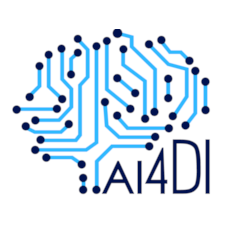EAI4IA Workshop
The International Workshop on Edge Artificial Intelligence for Industrial Applications (EAI4IA) is co-located with the International Joint Conference on Artificial Intelligence and the European Conference on Artificial Intelligence (IJCAI-ECAI 2022) in Vienna, Austria. EAI4IA aims to bring together researchers and practitioners working on providing edge artificial intelligence methods, techniques and tools to augment industrial applications. EAI4IA comprises technical presentations, keynotes and panel discussions focusing on industrial-edge AI hardware, software and AI frameworks.
Artificial Intelligence for Digitising Industry - AI4DI
The video gives an overview of the technology developments in the ECSEL JU AI4DI project for implementing artificial intelligence (AI) at the edge.
AI, IIoT, and robotics solutions are highlighted for the food and beverage industry, presenting use cases addressing novel AI-based environmental monitoring; autonomous environment-aware, quality control systems for champagne production, and production process optimisation and predictive maintenance for soybeans manufacturing.
AI4DI Smart Robot
Video presenting the AI4DI Smart Robot, which is a universal, multi-modal cognitive sensing platform. It includes cognitive sensing to perceive and understand the dynamically changing environment, robot control, smart sensors, AI-based perception, deep learning, and high-performance computing
AI4DI MaaS Simulation Video
This video presents ongoing activities of the Mobility-as-a-Service developments of the ECSEL JU project AI4DI (ai4di.eu). It showcases highlights related to the implementation of different simulation environment, namely SUMO and Unity, complementing real world data sources in Tampere, Finland. Involved partners include research facilities (VTT and OTH-AW) and SMEs (Vaisto and ITML).
AI4DI receives funding within the Electronic Components and Systems For European Leadership Joint Undertaking (ESCEL JU) in collaboration with the European Union's Horizon 2020 Framework Programme and National Authorities, under grant agreement n° 826060.
AI4DI animated introduction video
In the era of digital transformation, Artificial Intelligence is the way to drive digitising for the improvement of various industries. Digitising industry is enabling the European industry to achieve higher productivity, efficiency, and competitiveness. Even further, with the help of AI, we are now making the jump to intelligent industrial evolution and processing information at the edge, bringing Artificial Intelligence from the Cloud to the Edge, Silicon-Born-AI and Embedded System Born AI, and high-level architecture integrated into the industrial process.
AI4DI project addresses the needs of five diverse industrial sectors: industrial machinery, automotive manufacturing, semiconductor manufacturing, food and beverage industry, and transportation.
Virtual AI Training Environments
Current state-of-the-art approaches in Artificial Intelligence (AI) require large amounts of training data to solve industrial challenges. It is worth mentioning that the performance is highly dependent on the size and quality of the training data. While large datasets of real-world training data exist or can easily be generated for some problem domains, in robotics data is particularly hard to acquire due to the needed effort, time and hardware resources, or due to safety precautions.
To this end, the TUM team under the AI4DI project is developing simulation environments in which AI agents can be virtually-trained to control robots to execute industry-relevant challenges. To provide a high level of realism in simulated physics and rendering, we use high-end physics simulators and game development engines. In the video, we demonstrate how the virtual environment can be used to train an AI agent for solving a robotic manipulation task using reinforcement learning.
The benefits of fast and safe training in simulation come with the drawback of limited transferability of the simulation-trained AI agents to control real robots. This is still a major challenge due to the mismatch between the simulation and the real-world environment. In the next step of our research, we are working on approaches that can reduce the effects of the so-called reality gap and improve the transferability to real robots.
